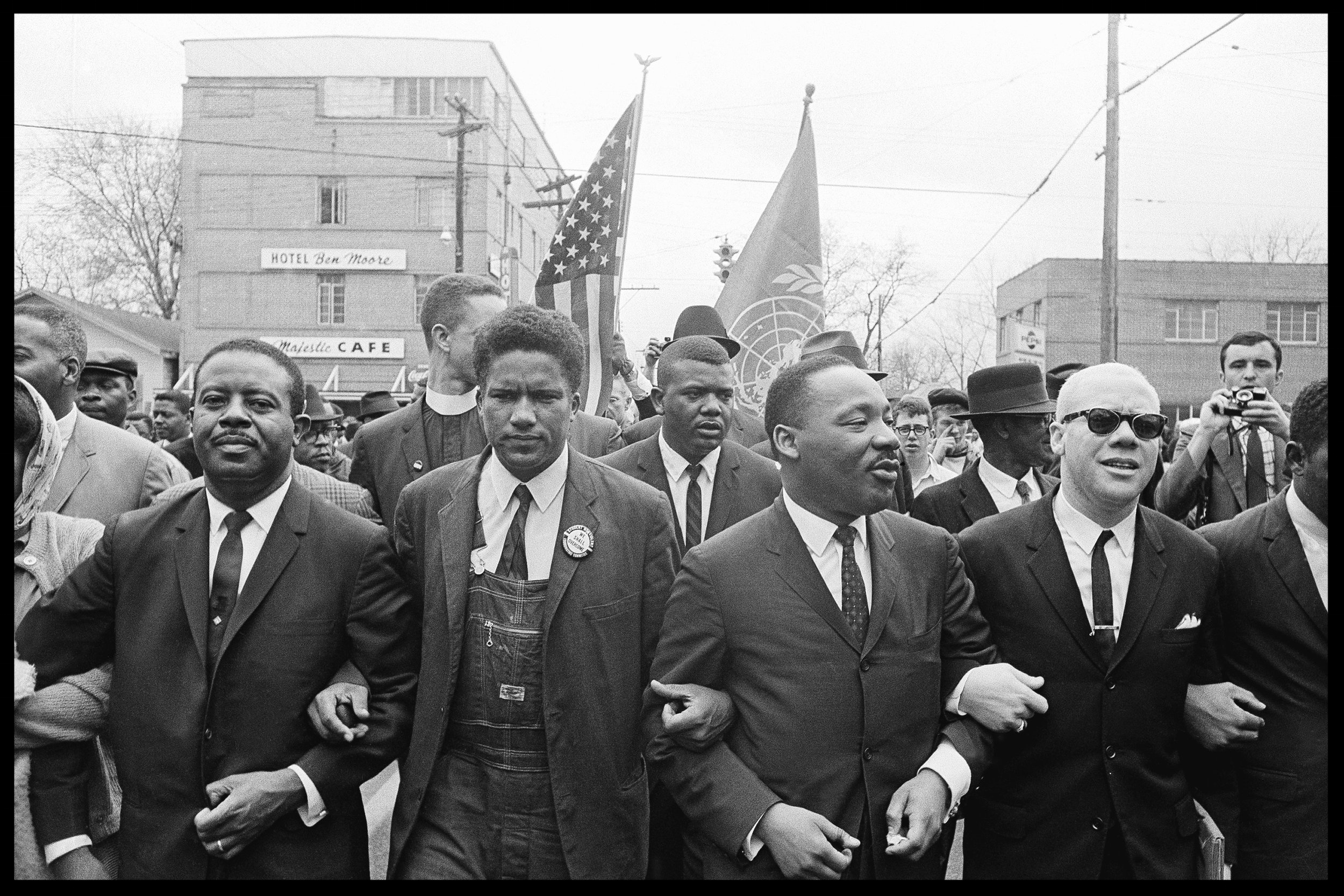One of the films that was up for Best Picture of the Year in the 2015 Academy Awards, was, Selma, an historical drama directed by Ava DuVernay, that dramatically recaptures that sad period in our history when African Americans were denied their right as citizens of this land to vote. After having received the Noble Peace Price in 1964, the Rev. Dr. Martin Luther King, Jr., is enlisted to lead a march from Selma, Alabama to Montgomery, the State Capital, to highlight this gross in justice. 2015 marked the 50th anniversary of this shameful confrontation between state troopers as marchers began to cross the infamous Edmund Pettus Bridge. As the peaceful marchers advanced they were attacked with clubs, horses, tear gas and other weapons. Many were badly injured. The scene was ominously broadcast throughout the nation on television.
Our nation’s long struggle to recognize the inherent dignity and equality of our African American brothers and sisters, brought to this country in slavery, freed in theory and law by the courageous Abraham Lincoln, yet viewed as second class citizens by many, is meticulously narrated by the author, Taylor Branch, in his now completed magisterial three volume work on the Civil Rights Movement. Branch began his work some thirty years ago and, faithful to his calling as an historian, he is mindful of the wise saying of the philosopher Santayana, that those who are unmindful of their history are doomed to repeat it. At the heart of this long and tortured story lies the reality of prejudice.
Prejudice, as Webster defines it, is a "preconceived judgment or opinion; unreasonable predilection or objection - an opinion or learning adverse to anything without just grounds or before sufficient knowledge". My brothers and sisters, all of us, to varying degrees can find ourselves victimized by prejudice - either as the victimizer or the victimized. It is easy at times for us to form judgments of others in an "unreasonable way - without just grounds or before sufficient knowledge" - perhaps based solely on a "feeling". It can be as simple and harmless as the years I used to tell my Father that I hated raw oysters, until the day I finally tried them and liked them" - to the much more serious and destructive prejudice that can lead to the wholesale destruction of peoples and nations.
So often, prejudice and discrimination are rooted in the "fear of the unknown". Our Scriptures today give us a perfect example of how the Israelites feared the unknown - ostracizing the leper from their midst, unaware - of course from a medical perspective - that the contagion was very difficult to transmit to another. This disease was thought to be God's divine punishment for one's own sins or that of one's ancestors. Jesus would not be victimized by such ignorance and discrimination. He saw beyond such small mindedness and fear to the person who reached out to him for compassion and healing. In response to his faith and trust in the Lord's power to make whole again, the man is given a new beginning and cured of his illness. But far more important, he is healed – he is made whole – by the gift of the lord’s unconditional love and acceptance.
We are not born with bigotry or prejudice. They are all too tragically learned behaviors and attitudes that are passed down to us from one generation to another. These attitudes and learned behaviors often grow in the environments of fear and ignorance. Whether it be the bigotry and prejudice towards other races, religions or even in this day and age, toward individuals with certain diseases, EBOLA or AIDS - our latter-day leprosies - all of this has no place in the life of a Christian. Some, in the name of Christianity and even within our own faith tradition have said during the height of the AIDS crisis that it was God's divine punishment on wayward individuals. I prefer to see it as, perhaps, God's way of discerning who among us will move beyond judgment and prejudice to compassion - like the Christ whose name we bear and, in whose name, we believe.
One of the great sins that we Christians will pay dearly for will be the bigotry and prejudice in which we have had complicity - whether it was the pogroms against the Jews, apartheid in South Africa; the genocide that has recently scared Eastern Europe as well as central Africa, the hatred that we have harbored toward our gay and lesbians brothers and sisters, or even the racial and ethnic slurs that all too easily come forth from our lips as we live in a multi-racial and culturally diverse communities.
A leper came to Jesus and kneeling down begged him and said, “If you wish, you can make me clean' My friends, as we look into our own hearts and acknowledge the prejudice and bigotry that may indeed continue to mark our lives, let us turn to the Lord, as the Leper in today's Gospel, with the request, “If you wish, you can make me clean” To which the Lord responded, "I do will it. Be made clean". May we go forth today – clean of heart - renewed and strengthened to reverence the presence of Christ in one another.
